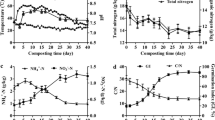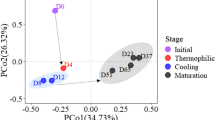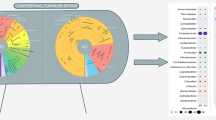Abstract
Composting is an excellent way to recycle biogas residues into a stable, non-toxic agricultural end product. In this study, the dynamic changes of physical–chemical parameters and bacterial community in three groups of bioaugmentation composting systems at different moisture contents (MC) of 50% (MC50), 60% (MC60) and 70% (MC70) were monitored. The differences of bacterial communities in composts with different initial MC were compared, and the interaction between biological and non-biological parameters was also explored. The results revealed that after 30 days of composting, the biogas residues compost in MC60 reached highest temperature of 64 °C, total Kjeldahl nitrogen (TKN) of 2%, seed germination index (GI) of 110%, and the longest thermophilic period duration of 5 days (55 °C). Additionally, the result of high-throughput sequencing showed that the diversity of bacterial communities in MC60 was the highest, and the abundance of Actinobacteria (16.93–52.63%), Firmicutes (8.71–56.75%), and Proteobacteria (16.88–46.95%) in all groups were the highest at phylum level. The LEfSe analysis indicated that the abundance of Ochrobactrum and Cellulomonadaceae in MC60 was significantly (p < 0.05) higher than with other treatments. Moreover, canonical correspondence analysis (CCA) indicated thermophilic period duration is significantly (p < 0.05) positively correlated with Paenibacillus. Besides, it was found the relative abundance of Nocardiopsis and Georgenia has a significant (p < 0.01) correlation with the fertilizer efficiency of compost. These results showed that controlling the initial moisture content at 60% can improve the maturity and fertilizer efficiency of compost, and enable the bacteria beneficial to composting to gain the advantage of proliferation.






Similar content being viewed by others
Data availability
The datasets generated during and analyzed during the current study are available from the corresponding author on reasonable request.
References
Abdellah YAY, Li T, Chen X, Cheng Y, Sun S, Wang Y, Jiang C, Zang H, Li C (2021) Role of psychrotrophic fungal strains in accelerating and enhancing the maturity of pig manure composting under low-temperature conditions. Bioresour Technol 320(Pt B):124402. https://doi.org/10.1016/j.biortech.2020.124402
Akyol Ç, Ince O, Ince B (2019) Crop-based composting of lignocellulosic digestates: focus on bacterial and fungal diversity. Bioresour Technol 288:121549. https://doi.org/10.1016/j.biortech.2019.121549
Awasthi MK, Wang M, Chen H, Wang Q, Zhao J, Ren X, Li DS, Awasthi SK, Shen F, Li R, Zhang Z (2017) Heterogeneity of biochar amendment to improve the carbon and nitrogen sequestration through reduce the greenhouse gases emissions during sewage sludge composting. Bioresour Technol 224:428–438. https://doi.org/10.1016/j.biortech.2016.11.014
Aziz Y, Shah GA, Rashid MI (2019) ZnO nanoparticles and zeolite influence soil nutrient availability but do not affect herbage nitrogen uptake from biogas slurry. Chemosphere 216:564–575. https://doi.org/10.1016/j.chemosphere.2018.10.119
Bennur T, Kumar AR, Zinjarde S, Javdekar V (2014) Nocardiopsis species as potential sources of diverse and novel extracellular enzymes. Appl Microbiol Biotechnol 98(22):9173–9185. https://doi.org/10.1007/s00253-014-6111-y
Bogusz A, Nowak K, Stefaniuk M, Dobrowolski R, Oleszczuk P (2017) Synthesis of biochar from residues after biogas production with respect to cadmium and nickel removal from wastewater. J Environ Manage 201:268–276. https://doi.org/10.1016/j.jenvman.2017.06.019
Cao J, Wang C, Dou Z, Liu M, Ji D (2018) Hyphospheric impacts of earthworms and arbuscular mycorrhizal fungus on soil bacterial community to promote oxytetracycline degradation. J Hazard Mater 341:346–354. https://doi.org/10.1016/j.jhazmat.2017.07.038
Choińska-Pulit A, Łaba W, Rodziewicz A (2019) Enhancement of pig bristles waste bioconversion by inoculum of keratinolytic bacteria during composting. Waste Manage 84:269–276. https://doi.org/10.1016/j.wasman.2018.11.052
Coban H, Miltner A, Elling FJ, Hinrichs KU, Kästner M (2015) The contribution of biogas residues to soil organic matter formation and CO2 emissions in an arable soil. Soil Biol Biochem 86:108–115. https://doi.org/10.1016/j.soilbio.2015.03.023
Costa LAM, Costa MSSM, Damaceno FM, Chiarelotto M, Bofinger J, Gazzola W (2021) Bioaugmentation as a strategy to improve the compost quality in the composting process of agro-industrial wastes. Environ Technol Innov 22:101478. https://doi.org/10.1016/j.eti.2021.101478
Cronjé AL, Turner C, Williams AG, Barker AJ, Guy S (2004) The respiration rate of composting pig manure. Compost Sci Utilization 12:119–129. https://doi.org/10.1080/1065657X.2004.10702170
de Bertoldi M, Vallini G, Pera A (1983) The biology of composting: a review. Waste Manage Res 1(1):157–176. https://doi.org/10.1177/0734242X8300100118
Edgar RC (2013) UPARSE: highly accurate OTU sequences from microbial amplicon reads. Nat Methods 10:996–998. https://doi.org/10.1038/nmeth.2604
Fang X, Li Q, Lin Y, Lin X, Dai Y, Guo Z, Pan D (2018) Screening of a microbial consortium for selective degradation of lignin from tree trimmings. Bioresour Technol 254:247–255. https://doi.org/10.1016/j.biortech.2018.01.058
Franke-Whittle IH, Knapp BA, Fuchs J, Kaufmann R, Insam H (2009) Application of COMPOCHIP microarray to investigate the bacterial communities of different composts. Microb Ecol 57(3):510–521. https://doi.org/10.1007/s00248-008-9435-2
Ge M, Shen Y, Ding J, Meng H, Zhou H, Zhou J, Cheng H, Zhang X, Wang J, Wang H, Cheng Q, Li R, Liu J (2022) New insight into the impact of moisture content and pH on dissolved organic matter and microbial dynamics during cattle manure composting. Bioresour Technol 344(Pt A):126236. https://doi.org/10.1016/j.biortech.2021.126236
Hayakawa M, Yamamura H, Nakagawa Y, Kawa Y, Hayashi Y, Misonou T, Kaneko H, Kikushima N, Takahashi T, Yamasaki S, Uegaki Y, Terasawa A, Takao K, Mori T, Ago K, Saito N, Hasegawa T (2010) Taxonomic diversity of actinomycetes isolated from swine manure compost. Actinomycetologica 24(2):58–62. https://doi.org/10.3209/saj.saj240202
José AA, de la Carlos F, Alicia FC, Lucía C, Juan C, Manuel A, María PB (2012) Assessment of the fertiliser potential of digestates from farm and agroindustrial residues. Biomass Bioenergy. https://doi.org/10.1016/j.biombioe.2012.02.018
Jurado MM, Suárez-Estrella F, López MJ, López-González JA, Moreno J (2019) Bioprospecting from plant waste composting: actinobacteria against phytopathogens producing damping-off. Biotechnol Rep (amst) 23:e00354. https://doi.org/10.1016/j.btre.2019.e00354
Kitamura R, Ishii K, Maeda I, Kozaki T, Iwabuchi K, Saito T (2016) Evaluation of bacterial communities by bacteriome analysis targeting 16S rRNA genes and quantitative analysis of ammonia monooxygenase gene in different types of compost. J Biosci Bioeng 121(1):57–65. https://doi.org/10.1016/j.jbiosc.2015.05.005
Koeck DE, Maus I, Wibberg D, Winkler A, Zverlov VV, Liebl W, Pühler A, Schwarz WH, Schlüter A (2015) Draft genome sequence of Herbinix hemicellulosilytica T3/55T, a new thermophilic cellulose degrading bacterium isolated from a thermophilic biogas reactor. J Biotechnol 214:59–60. https://doi.org/10.1016/j.jbiotec.2015.07.022
Kovaleva NO, Kovalev IV (2009) Transformation of lignin in surface and buried soils of mountainous landscapes. Eurasian Soil Sci 42(11):1270–1281. https://doi.org/10.1134/s1064229309110106
Li S, Li D, Li J, Li G, Zhang B (2017) Evaluation of humic substances during co-composting of sewage sludge and corn stalk under different aeration rates. Bioresour Technol 245:1299–1302. https://doi.org/10.1016/j.biortech.2017.08.177
Li C, Li H, Yao T, Su M, Ran F, Han B, Li J, Lan X, Zhang Y, Yang X, Gun S (2019) Microbial inoculation influences bacterial community succession and physicochemical characteristics during pig manure composting with corn straw. Bioresour Technol 289:121653. https://doi.org/10.1016/j.biortech.2019.121653
Li MX, He XS, Tang J, Li X, Zhao R, Tao YQ, Wang C, Qiu ZP (2021) Influence of moisture content on chicken manure stabilization during microbial agent-enhanced composting. Chemosphere 264(Pt 2):128549. https://doi.org/10.1016/j.chemosphere.2020.128549
Lin YP, Huang GH, Lu HW, He L (2008) Modeling of substrate degradation and oxygen consumption in waste composting processes. Waste Manage 28(8):1375–1385. https://doi.org/10.1016/j.wasman.2007.09.016
Liu N, Zhou J, Han L, Ma S, Sun X, Huang G (2017) Role and multi-scale characterization of bamboo biochar during poultry manure aerobic composting. Bioresour Technol 241:190–199. https://doi.org/10.1016/j.biortech.2017.03.144
Lu L, Zeng G, Fan C, Guo J, Zhang J, Chen M, Wu H, Yuan Y, He X, He Y (2015) Environmental factors shaping the abundance and distribution of laccase-encoding bacterial community with potential phenolic oxidase capacity during composting. Appl Microbiol Biotechnol 99(21):9191–9201. https://doi.org/10.1007/s00253-015-6754-3
Ma S, Fang C, Sun X, Han L, He X, Huang G (2018) Bacterial community succession during pig manure and wheat straw aerobic composting covered with a semi-permeable membrane under slight positive pressure. Bioresour Technol 259:221–227. https://doi.org/10.1016/j.biortech.2018.03.054
Meng Q, Xu X, Zhang W, Cheng L, Men M, Xu B, Deng L, Sun X (2019) Diversity and abundance of denitrifiers during cow manure composting. Rev Argent Microbiol 51(3):191–200. https://doi.org/10.1016/j.ram.2018.08.003
Montejo C, Ramos P, Costa C, Márquez MC (2010) Analysis of the presence of improper materials in the composting process performed in ten MBT plants. Bioresour Technol 101(21):8267–8272. https://doi.org/10.1016/j.biortech.2010.06.024
Nakasaki K, Hirai H, Mimoto H, Quyen TNM, Koyama M, Takeda K (2019) Succession of microbial community during vigorous organic matter degradation in the primary fermentation stage of food waste composting. Sci Total Environ 671:1237–1244. https://doi.org/10.1016/j.scitotenv.2019.03.341
Nam IH, Kim Y, Cho D, Kim JG, Song H, Chon CM (2015) Effects of heavy metals on biodegradation of fluorene by a Sphingobacterium sp. strain (KM-02) isolated from polycyclic aromatic hydrocarbon-contaminated mine soil. Environ Eng Sci 32(10):891–898. https://doi.org/10.1089/ees.2015.0037
Obi LU, Atagana HI, Adeleke RA (2016) Isolation and characterisation of crude oil sludge degrading bacteria. Springerplus 5(1):1946. https://doi.org/10.1186/s40064-016-3617-z
Partanen P, Hultman J, Paulin L, Auvinen P, Romantschuk M (2010) Bacterial diversity at different stages of the composting process. BMC Microbiol 10:94. https://doi.org/10.1186/1471-2180-10-94
Patil KS, Lee SJ, Park SJ, Chae JC (2016) Genome sequence of Ochrobactrum anthropi AM3 isolated from compost. Korean J Microbiol 52(4):503–504. https://doi.org/10.7845/kjm.2016.6075
Peng L, Ma R, Jiang S, Luo W, Li Y, Wang G, Xu Z, Wang Y, Qi C, Li Y, Li G, Yuan J (2022) Co-composting of kitchen waste with agriculture and forestry residues and characteristics of compost with different particle size: an industrial scale case study. Waste Manag 149:313–322. https://doi.org/10.1016/j.wasman.2022.06.029
Petric I, Mustafić N (2015) Dynamic modeling the composting process of the mixture of poultry manure and wheat straw. J Environ Manage 161:392–401. https://doi.org/10.1016/j.jenvman.2015.07.033
Piccinni FE, Ontañon OM, Ghio S, Sauka DH, Talia PM, Rivarola ML, Valacco MP, Campos E (2019) Secretome profile of Cellulomonas sp. B6 growing on lignocellulosic substrates. J Appl Microbiol 126(3):811–825. https://doi.org/10.1111/jam.14176
Qian X, Shen G, Wang Z, Guo C, Liu Y, Lei Z, Zhang Z (2014) Co-composting of livestock manure with rice straw: characterization and establishment of maturity evaluation system. Waste Manag 34(2):530–535. https://doi.org/10.1016/j.wasman.2013.10.007
Qiao C, Ryan Penton C, Liu C, Shen Z, Ou Y, Liu Z, Xu X, Li R, Shen Q (2019) Key extracellular enzymes triggered high-efficiency composting associated with bacterial community succession. Bioresour Technol 288:121576. https://doi.org/10.1016/j.biortech.2019.121576
Rawoteea SA, Mudhoo A, Kumar S (2017) Co-composting of vegetable wastes and carton: effect of carton composition and parameter variations. Bioresour Technol 227:171–178. https://doi.org/10.1016/j.biortech.2016.12.019
Ren G, Xu X, Qu J, Zhu L, Wang T (2016) Evaluation of microbial population dynamics in the co-composting of cow manure and rice straw using high throughput sequencing analysis. World J Microbiol Biotechnol 32(6):101. https://doi.org/10.1007/s11274-016-2059-7
Sarkar S, Banerjee R, Chanda S, Das P, Ganguly S, Pal S (2010) Effectiveness of inoculation with isolated Geobacillus strains in the thermophilic stage of vegetable waste composting. Bioresour Technol 101(8):2892–2895. https://doi.org/10.1016/j.biortech.2009.11.095
Shen F, Zhong B, Wang Y, Xia X, Zhai Z, Zhang Q (2019) Cellulolytic Microflora pretreatment increases the efficiency of anaerobic co-digestion of rice straw and pig manure. BioEnergy Res 12(3):703–713. https://doi.org/10.1007/s12155-019-10013-w
Stefaniuk M, Oleszczuk P (2016) The total and freely dissolved polycyclic aromatic hydrocarbons content in residues from biogas production. Environ Pollut 208:787–795. https://doi.org/10.1016/j.envpol.2015.10.059
Sun S, Abdellah YAY, Miao L, Wu B, Ma T, Wang Y, Zang H, Zhao X, Li C (2022) Impact of microbial inoculants combined with humic acid on the fate of estrogens during pig manure composting under low-temperature conditions. J Hazard Mater 424(Pt D):127713. https://doi.org/10.1016/j.jhazmat.2021.127713
Tambone F, Genevini P, D’Imporzano G, Adani F (2009) Assessing amendment properties of digestate by studying the organic matter composition and the degree of biological stability during the anaerobic digestion of the organic fraction of MSW. Bioresour Technol 100(12):3140–3142. https://doi.org/10.1016/j.biortech.2009.02.012
Tiquia SM, Tam NFY, Hodgkiss IJ (1996) Microbial activities during composting of spent pig-manure sawdust litter at different moisture contents. Bioresour Technol 55(3):201–206. https://doi.org/10.1016/0960-8524(95)00195-6
TMECC (Test Methods for the Examination of Composts and Composting) (2002). In: Thompson W, Leege P, Millner P, Watson ME (eds) The US composting council. US Government Printing Office, USA
Uke A, Chhe C, Baramee S, Tachaapaikoon C, Pason P, Waeonukul R, Ratanakhanokchai K, Kosugi A (2021) Draft genome sequence data of Paenibacillus cisolokensis strain LC2-13A and Xylanibacillus composti strain K-13. Data Brief 38:107361. https://doi.org/10.1016/j.dib.2021.107361
Wang SP, Zhong XZ, Wang TT, Sun ZY, Tang YQ, Kida K (2017) Aerobic composting of distilled grain waste eluted from a Chinese spirit-making process: the effects of initial pH adjustment. Bioresour Technol 245:778–785. https://doi.org/10.1016/j.biortech.2017.09.051
Wang K, Chu C, Li X, Wang W, Ren N (2018) Succession of bacterial community function in cow manure composing. Bioresour Technol 267:63–70. https://doi.org/10.1016/j.biortech.2018.06.028
Wei Z, Ahmed Mohamed T, Zhao L, Zhu Z, Zhao Y, Wu J (2022) Microhabitat drive microbial anabolism to promote carbon sequestration during composting. Bioresour Technol 346:126577. https://doi.org/10.1016/j.biortech.2021.126577
Wu ZY, Gong YH, Yu QX (2013) Photoacoustic spectroscopy detection and extraction of discharge feature gases in transformer oil based on 1.5μ tunable fiber laser. Infrared Phys Technol 58:86–90. https://doi.org/10.1016/j.infrared.2013.01.002
Wu M, Guo X, Wu J, Chen K (2020) Effect of compost amendment and bioaugmentation on PAH degradation and microbial community shifting in petroleum-contaminated soil. Chemosphere 256:126998. https://doi.org/10.1016/j.chemosphere.2020.126998
Xu Y, Lu M (2010) Bioremediation of crude oil-contaminated soil: comparison of different biostimulation and bioaugmentation treatments. J Hazard Mater 83(1–3):395–401. https://doi.org/10.1016/j.jhazmat.2010.07.038
Xu Z, Zhao B, Wang Y, Xiao J, Wang X (2019) Composting process and odor emission varied in windrow and trough composting system under different air humidity conditions. Bioresour Technol 297:122482. https://doi.org/10.1016/j.biortech.2019.122482
Yang L, Zhang S, Chen Z, Wen Q, Wang Y (2016) Maturity and security assessment of pilot-scale aerobic co-composting of penicillin fermentation dregs (PFDs) with sewage sludge. Bioresour Technol 204:185–191. https://doi.org/10.1016/j.biortech.2016.01.004
Yang XC, Han ZZ, Ruan XY, Chai J, Jiang SW, Zheng R (2019) Composting swine carcasses with nitrogen transformation microbial strains: Succession of microbial community and nitrogen functional genes. Sci Total Environ 688:555–566. https://doi.org/10.1016/j.scitotenv.2019.06.283
Zainudin MH, Mustapha NA, Maeda T, Ramli N, Sakai K, Hassan M (2020) Biochar enhanced the nitrifying and denitrifying bacterial communities during the composting of poultry manure and rice straw. Waste Manage 106:240–249. https://doi.org/10.1016/j.wasman.2020.03.029
Zang B, Li S, Michel F Jr, Li G, Luo Y, Zhang D, Li Y (2016) Effects of mix ratio, moisture content and aeration rate on sulfur odor emissions during pig manure composting. Waste Manage 56:498–505. https://doi.org/10.1016/j.wasman.2016.06.026
Zhang X, Li X, Zhao X, Chen X, Zhou B, Weng L, Li Y (2020) Bioelectric field accelerates the conversion of carbon and nitrogen in soil bioelectrochemical systems. J Hazard Mater 388:121790. https://doi.org/10.1016/j.jhazmat.2019.121790
Zhao Y, Lu Q, Wei Y, Cui H, Zhang X, Wang X, Shan S, Wei Z (2016) Effect of actinobacteria agent inoculation methods on cellulose degradation during composting based on redundancy analysis. Bioresour Technol 219:196–203. https://doi.org/10.1016/j.biortech.2016.07.117
Zhong XZ, Li XX, Zeng Y, Wang SP, Sun ZY, Tang YQ (2020) Dynamic change of bacterial community during dairy manure composting process revealed by high-throughput sequencing and advanced bioinformatics tools. Bioresour Technol 306:123091. https://doi.org/10.1016/j.biortech.2020.123091
Zhou Y, Hu Y, Chen AJY, Cheng Z, Bi Z, Zhang R, Lou Z (2022) Environmental impacts and nutrient distribution routes for food waste separated disposal on large-scale anaerobic digestion/ composting plants. J Environ Manage 318:115624. https://doi.org/10.1016/j.jenvman.2022.115624
Zhu FX, Yao YL, Wang SJ, Du RG, Wang WP, Chen XY, Hong CL, Qi B, Xue ZY, Yang HQ (2015) Housefly maggot-treated composting as sustainable option for pig manure management. Waste Manag 35:62–67. https://doi.org/10.1016/j.wasman.2014.10.005
Funding
This study was supported by Key Research and Development Program of Jiangxi Province, China (20192BBF60055), the High-level and High-skilled Leading Talents Training Project of Jiangxi Province, China, Science and Technology Project Founded by the Education Department of Jiangxi Province, China (GJJ180174).
Author information
Authors and Affiliations
Contributions
SZ: Methodology, Investigation, Writing—Original Draft. BZ: Investigation, Formal analysis, Writing—Review & Editing. XA: Data Curation, Software. YH: Validation, XX: Validation, QZ: Conceptualization, Resources, Supervision. All authors reviewed the manuscript.
Corresponding author
Ethics declarations
Competing interests
The authors declare no competing interests.
Competing interest
The authors have no relevant financial or non-financial interests to disclose.
Research involving human and animal participants
This article does not contain any studies with human participants or animals performed by any of the authors.
Additional information
Publisher's Note
Springer Nature remains neutral with regard to jurisdictional claims in published maps and institutional affiliations.
Supplementary Information
Below is the link to the electronic supplementary material.
Rights and permissions
Springer Nature or its licensor (e.g. a society or other partner) holds exclusive rights to this article under a publishing agreement with the author(s) or other rightsholder(s); author self-archiving of the accepted manuscript version of this article is solely governed by the terms of such publishing agreement and applicable law.
About this article
Cite this article
Zhang, S., Zhong, B., An, X. et al. Effect of moisture content on the evolution of bacterial communities and organic matter degradation during bioaugmented biogas residues composting. World J Microbiol Biotechnol 39, 1 (2023). https://doi.org/10.1007/s11274-022-03454-7
Received:
Accepted:
Published:
DOI: https://doi.org/10.1007/s11274-022-03454-7




